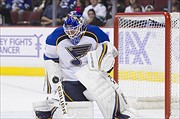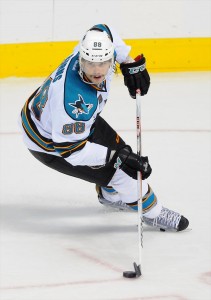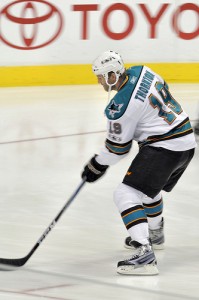
This series preview was published by THW St. Louis Blues correspondent Jeff Ponder and THW San Jose Sharks correspondent Walter McLaughlin.
Regular Season Series Winner
St. Louis Blues (4-0-0)
Regular Season Series Top Offensive Performer
Alex Pietrangelo (2G-3A—5P)
Regular Season Series Top Goaltender
Jaroslav Halak (.977 save percentage, 0.50 GAA and 1 shutout; stopped 43 of 44 shots).
The Blues’ Take
Looking at the regular season series, it would be easy for one to assume that the Blues stand a good chance of knocking the Sharks out of the playoffs quickly. Such as it is in any professional sport, there is more than meets the eye.
Not so happily ever after. The Blues ended the 2011-12 regular season on a disappointing note, despite being the Central Division Champions. Although they grabbed a victory in their last game of the season against the Dallas Stars, the Blues posted a 1-2-2 record in their last five games. This included a loss to the Red Wings in a game that they held a 2-0 lead with 10:00 remaining in the 3rd period, and a 5-2 drubbing at the hands of the league-worst Columbus Blue Jackets. Head Coach Ken Hitchcock tirelessly struggled to find the correct combinations on the forward lines, resulting in former 20-goal scorer Matt D’Agostini sitting out the final game of the season in Dallas. Hitchcock resurrected a solid 4th-line filled with muckers and grinders and the Blues pulled out their 1st victory in 11 calendar days.
First Division Championship in 11 seasons. After a long rebuild and struggles to open the season (starting the season 6-7-0 before hiring Hitchcock on November 7), Blues management has built a solid roster with depth better than most in the league. Despite outstanding injuries to key players down the stretch (Andy McDonald missed 57 games with a concussion and a shoulder injury), the Blues got timely scoring from all four lines and received fantastic goaltending from Jaroslav Halak and Brian Elliott. The Blues outworked their opponents in many situations and found themselves atop the Western Conference in mid-January. The Blues continued their play until they finally clinched the Central Division Title on March 31, something they have not done since 1999-2000. They finished just two points back of the President’s Trophy-winning Vancouver Canucks.

Goaltenders getting it done. When asked a few weeks ago which goaltender would be the starter for Game 1 of the playoffs, Coach Hitchcock said that he was putting his decision off “until the last possible moment.” When Jaroslav Halak was asked Monday what Hitchcock had decided, he gave a very candid response.
“I wish I knew,” said Halak.
This is a very difficult decision for Hitchcock to make. The goaltenders have both been playing a very 1A-1B situation. Brian Elliott posted a league-best GAA (1.56) and save percentage (.940). His 9 shutouts were 2nd in the league only to Jonathan Quick of the Los Angeles Kings (10). Halak, the starting goalie heading into the season, was right behind Elliott in most statistics. He was tied for 4th in the league in GAA (1.97) and was 6th in save percentage (.926). He was also tied for 5th in shutouts (6). Both goaltenders tied an NHL modern-era regular season record, recording a combined 15 shutouts for the team. If the Blues are to win this series, goaltending will have to continue to be the Blues’ strong suit in every game.

Home-ice advantage will drive the Blues. Only one team finished higher than the Blues in the overall-best home record, and that team strung together 23 consecutive wins on home ice. The Blues posted an amazing 30-6-5 record at Scottrade Center, which was just one win less than the Red Wings. The Blues posted an impressive +50 goal differential while on home ice this season, which also ranked second in the league. Acquiring home-ice for the 1st round was a very important task that the Blues had to accomplish.
Goal-scoring is the only issue. While the Blues have everything figured out in their own end of the ice, the offense is still seeing some struggles after a Cinderella season. The Blues were shutout four times this season, two of those losses coming with the other team putting up two goals or less. The top line most of the season contained David Perron, David Backes and T.J. Oshie, but Perron has been taken off that line periodically to help balance the scoring on the other lines. With a fully healthy lineup, it is believed that this will be the line relied on to score big goals in the playoffs. If this line is shut down too often, the Blues will have to rely on the other three lines to step up their game and score some timely goals. With Alex Steen, Andy McDonald and Matt D’Agostini all finally healthy heading into the playoffs, the offensive production that this team will muster is the biggest question mark.
How the Blues get past the Sharks. Timely goaltending and even timelier goal-scoring are the keys for St. Louis. The Blues have found that the goals can come in bunches (ask the Edmonton Oilers) or they can come in small fragments throughout the game (ask the Columbus Blue Jackets). If the Blues can score early and not depend on a 3rd period comeback, they should be able to hold the lead since the team’s reliables, Alex Pietrangelo and David Backes, will be seeing a lot of minutes against the big San Jose guns (Joe Thornton, Joe Pavelski and Patrick Marleau). What the Blues have done all season long will win this series; hard work and the ability to keep the Sharks at bay.
The Sharks’ Take

Over the past decade, the Sharks have been one of the league’s most consistent regular season franchises, having won the Pacific division six times since 2001-02, earning 99 or more points in all but one season during that span. Having reached the doorstep of the Finals two years in a row (losing to Chicago and Vancouver in consecutive conference finals trips), General Manager Doug Wilson made two bold moves designed to bolster the back line and add proven playoff leadership, while not overly compromising the team’s greatest strength: its forward depth. As such, sniper Dany Heatley and young winger Devon Setoguchi were sent to the Minnesota Wild in separate deals for right winger Martin Havlat and blue liner Brent Burns.
A tale of two (halves of the same) season. Chemistry is a tricky thing to predict, as is momentum. After starting the season 31-17-6 and sitting atop the Pacific for most of that time frame, the team’s offense — already performing below expectations — began to falter. The months of February and March were particularly unkind to San Jose: they scored just 69 goals in 31 games and went 12-15-4, dropping them temporarily into 9th in the conference standings. Although the Sharks won their final four games to capture the 7th seed, there is a far greater sense of uncertainty than ever before. Which team will show up against the 2nd seeded Blues, the Dr. Jekyll squad that went into February like a lion, or the Mr. Hyde club that exited March like a lamb?
Dr. Niemi. Antti Niemi posted his second consecutive steady season, finishing 9th in the league in wins with 34, along with posting a 2.42 GAA and a .915 save percentage. His six shutouts tied him for 5th in the league in that category. Thomas Greiss’ 9-7-1 record, along with a 2.30 GAA and a .915 save percentage, represented more than capable backup netminding. With San Jose giving up the 8th fewest shots in the league and both goalies playing well, the Sharks should be prepared for the low-scoring, tight-checking games typically seen during the playoffs.
Mr. Offense. It’s strange to think of the Sharks’ offense as a potential Achilles’ heel going into the playoffs. Certainly, the overall numbers were satisfactory, if not spectacular: 13th in the league at 2.67 goals/game, with the league’s 2nd best power play at 21.1%. However, the swoon in February and March was palpable, as the Sharks averaged just 2.23 goals per game. After Couture (31 goals), Pavelski (31) and Marleau (30), the goal scoring thinned out considerably, with only three other players in double-digits. Head Coach Todd McLellan tried numerous line changes to even out the scoring, with limited success. For the first time in recent memory, San Jose did not possess a deep forward group, and that lack of depth manifested itself as the season progressed. Martin Havlat’s 39-game stint on the IR further compromised a relatively sub-par (for them) offensive attack.

Dr. Thornton. What else can be said about one of the league’s true superstars and a sure Hall of Famer after he decides to hang ’em up? He may be a bit reluctant to shoot the puck (read San Jose’s Second-Half Center of Attention: Jumbo Joe), but in the end, 18 goals, 77 points and +17 represents another solid campaign for the 32 year old Captain. When asked about the Blues, Thornton said, “”They’re the second-best team in the West for a reason. It’s not a mistake. They’ve played well since (head coach Ken Hitchcock) took over, and it will be a good test for us.”
Mr. Penalty kill. The other significant weakness of the Sharks, and it’s a doozy. The club finished 29th in the league at 76.9%, just ahead of the sad-sack Blue Jackets. By contrast, the Blues kill penalties at an 85.8% rate, 7th in the NHL. No doubt Wilson’s hope was that the acquisition of Burns would help bolster the team in this area, and in that regard, it did not pay off.
How to beat the Blues. On the surface, the Sharks are scratching their heads after going 0-4 versus St. Louis this season and being outscored 11-3 in the process. Head Coach Todd McLellan called them “a hell of a team” and pointed out: “They competed right to the last day for the Presidents’ Trophy.” To win, the Sharks are going to have to see Mr. Offense produce, no small task against a team that was 1-goal off the NHL record for fewest goals against in an 82-game schedule (164 goals-against set by the New Jersey Devils in 2003-04). Furthermore, although the Blues’ 19th ranked power play won’t scare anybody, it will be facing a terrible Sharks’ penalty kill, so something has to give. If San Jose can solve St. Louis’ terrific defense and goaltending three or more times a game, they have a chance to win this series. They have the edge in playoff experience, which they will need to help overcome St. Louis’ terrific home ice advantage.
Series Schedule – All Times Eastern
Game 1: Thursday, April 12, 2012 7:30 p.m. San Jose at St. Louis CNBC, TSN
Game 2: Saturday, April 14, 2012 7:30 p.m. San Jose at St. Louis CNBC, TSN
Game 3: Monday, April 16, 2012 10 p.m. St. Louis at San Jose NBC Sports Network, TSN
Game 4: Thursday, April 19, 2012 10:30 p.m. St. Louis at San Jose NBC Sports Network, TSN
*Game 5: Saturday, April 21, 2012 7:30 p.m. San Jose at St. Louis CNBC, TSN
*Game 6: Monday, April 23, 2012 TBD St. Louis at San Jose TBD
*Game 7: Wednesday, April 25, 2012 TBD San Jose at St. Louis TBD